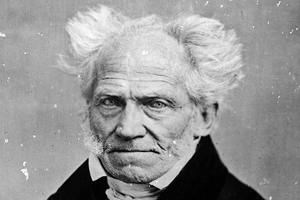
Your complimentary articles
You’ve read one of your four complimentary articles for this month.
You can read four articles free per month. To have complete access to the thousands of philosophy articles on this site, please
Articles
The Goodness of Existence
Jarlath Cox says whether life brings pleasure or pain, the value of being born is the ability to experience at all.
Nearly everyone is led to question the goodness of their existence at some point in their life. Whether this is due to an accumulation of personal set-backs, an event badly affecting a friend or family member, or simply due to nightly news reports of widespread tragedy, suffering, and war throughout the world, such things can make us question the goodness of being born at all. Is existence, all in all, really as good as we’re often inclined to believe? Or is the peaceful state of non-existence not getting the endorsement it deserves?
One who affirms the latter position is the South African philosopher David Benatar. He is an advocate of antinatalism, the position that procreation is morally wrong due to the inherent suffering and harm with which people are afflicted upon being born into this world. Antinatalists believe the human race should stop reproducing.
Benatar sets forth a rational and logical argument, devoid of any appeal to emotion, as to why our existence is objectively more harmful than beneficial to us. He does so most extensively in his 2006 book Better Never to Have Been: The Harm of Coming Into Existence, although much of this article refers to his papers ‘Why coming into Existence is Always a Harm’ and ‘How Bad is Coming into Existence?’ (2017), available at Oxford Scholarship Online. Benatar highlights our psychological predisposition to discount memories of suffering, and instead tend not only to look favourably on past events, but also to view possible future events optimistically, something known to psychologists as the Pollyanna Principle. Contrary to our proclivity for pollyannaism, Benatar insists that from an objective standpoint we experience much more harm than benefit. In line with the pessimistic views of Arthur Schopenhauer (1788-1860), he maintains that pleasure is not our default state, but merely a temporary relief from the pain of being.
Benatar goes further than saying non-existence is a neutral state: he argues that non-existence necessarily is a positive benefit. He expatiates this assertion through an argument which claims that the values we ascribe to pleasure differ between describing an existent state and a non-existent one. So when Person X (let’s call them ‘Xavier’) exists, this symmetrical evaluation holds true:
1) The presence of pain is bad; and
2) The presence of pleasure is good.
However, when Xavier does not exist, the symmetry breaks down thus:
3) The absence of pain is good, even if that good is not enjoyed by anyone; whereas
4) The absence of pleasure is not bad unless there is somebody for whom this absence is a deprivation.
When Xavier exists, the presence of pain is bad and its absence good. Pain maintains its symmetrical value even when Xavier does not exist, as its absence is also then valued as good. However, the symmetry breaks down regarding pleasure, since when Xavier exists the presence of pleasure is good, yet in his non-existence the absence of pleasure isn’t bad, it is only ‘not good or bad’, that is, it is morally neutral.
By allowing this asymmetry, Benatar can positively evaluate the non-existent state. In this evaluation there is nothing negative about non-existence, as somebody who does not exist is not deprived of anything. They are not missing out on pleasurable experiences; they simply don’t exist. On this account, deprivation affects only people who do exist or have existed. However, on Benatar’s account, the absence of pain is good even if its absence is not enjoyed by anybody! So all in all, the state of non-existence is a positive one. Thus Benatar holds that non-existence is preferable to existence. (This evaluation is supposed to be true even for someone who is afflicted with only the most minimal pain throughout their life. Even if throughout their entire life someone suffers only a pinprick on their thumb, the non-existent state retains its ‘absence of pain’ benefit, therefore it is still a more positive state on aggregate.)
Benatar’s ‘asymmetry argument’ supposedly nullifies the ‘deprivation theory’ and its account of the goodness of existence. Shelly Kagan defines the deprivation theory as an “account of evil or the badness of death, since it holds that what is centrally bad about death is that it deprives you of the goods of life you might otherwise be getting” (Death, 2012). Benatar argues that we would not be deprived of pleasurable experiences if we never existed in the first place. Benatar’s argument for antinatalism essentially rests on the asymmetrical value of pleasure between existent and non-existent states. By asserting that the absence of pleasure in non-existence is neither good nor bad, he avoids problems from the deprivation account. However, the deprivation theory is not completely dispelled, as it remains relevant for those who once existed who have passed away. Through death they have been deprived of pleasurable experiences.

Rainbow over Lake Ontario © Jasonpettit 2018 CC
Criticisms of Antinatalism
Critics of antinatalism, such as Joel Feinberg and Derek Parfit, have attempted to invalidate antinatalist claims by highlighting what is known as the non-identity problem. Feinberg’s argument maintains that for somebody to be better-off (or worse-off) in a non-existent state, they would have to have previously existed. His argument is as follows:
1) For something to harm somebody, it must make that person worse off.
2) The ‘worse off’ relation is a relation between two states.
3) Thus, for somebody to be worse off in some state, the alternative state with which it is compared must be one in which he is less badly, or better, off.
4) But non-existence is not a state in which anybody can be, and thus cannot be compared with anybody’s existing states.
5) Thus coming into existence cannot be worse than never coming into existence.
6) Therefore, coming into existence can never be a harm.
However, Benatar’s asymmetry argument mitigates much of this. Benatar claims that someone need not exist for them to benefit from the absence of pain. As he maintains, the absence of pain is good even if there is nobody about to appreciate it. Asymmetrically, however, the absence of pleasure does need a relevant person to exist for its absence to be a deprivation.
In his response to Feinberg that to appraise the absence of pain in non-existence does not require us to be non-existent, Benatar appears to have mitigated the strength of the non-identity problem. It’s reasonable to grant that we can evaluate a scenario without having actually experienced it. Yet our evaluation of that scenario is grounded in its relation to our experiences of other, present states. This causes problems for the asymmetry argument, which I will address later.
The late Derek Parfit also criticises the antinatalist stance. He made the point that if saving a life is a positive thing, then so is creating one. Parfit further claims that it is a positive thing to save a person’s life – even if doing so causes the person a major impairment, such as losing a limb. And if it is positive to save a life even at the cost of impairment, then it is also positive to start a life, even if that life may be similarily impaired, whether physiologically, socially, economically, environmentally, or in any other way. This argument aims to show that our existence is good even if we are deprived of many things. As Parfit states, “if I am benefited by having my life saved after it started (even at the expense of acquiring some severe but non-catastrophic impairment), then it is not implausible to claim I am benefited by having my life started (with such an impairment).” However, Benatar replies that “where there are no (or very weak) interests in existing, causing impairments (bringing people with defects into being) cannot be warranted by the protection of such interests.”
He also highlights a distinction between ‘present lives’ and ‘future lives’ – a distinction he claims Parfit attempts to minimise. Benatar holds that when people make judgments of ‘lives worth living’ and ‘lives not worth living’, they’re making judgments about present lives. Yet for him there is a great ethical difference between present lives and future lives, since present lives have a moral relevance that future lives lack. Peoples’ present lives have moral relevance because they’re conscious beings, with sentiments, thoughts, interests, agency and so on – but no such things now exist for future lives.
My Response to Benatar’s Argument
There appear to be a number of oversights in Benatar’s evaluations which cause problems for his argument. But before responding to his claims we must look at the relationship between pleasure and pain, since the nature of this relationship is integral to his argument. First, there is no accurate objective assessment of pleasure or pain. What one person might regard as painful, another might regard as pleasurable. Take the phenomenon of masochism, for instance. Further, the relationship of pleasure to pain is a zero-sum game: pain detracts from pleasure, and vice versa. One could have the pleasure of eating an ice-cream while suffering from a sprained ankle, and the pleasure of eating the ice cream is depreciated by the pain from the ankle. Some people may also have mixed feelings about an event. However, one sensation will always predominate, even if this predominance is infinitesimal. Sometimes we might assume we have a neutral state of sensations or feelings towards something; yet all this means is that our sensations are less pronounced. For example, some ‘neutral state’ may leave us feeling bored, which is negative; while in other situations a ‘neutral state’ may mean we feel at peace, which is positive. There is no entirely neutral state of ‘neither good nor bad’ experience.
The relationship between harms and benefits is also zero-sum in the sense that the absence of one indicates the presence of the other. So the absence of pleasure must be a harm. Therefore, non-existence is not ‘entirely beneficial’, but rather, a harm. This claim rests on the point that the relationship between pleasure/pain must be the same even for non-existence as for existence. There is no reason to assume that conceptually, the relationship between positive and negative sensations alters simply because we do not exist. So if in our existent state the presence of pain is bad and the presence of pleasure is good, there is absolutely nothing to suggest that this should change for the non-existent state, even though there is nobody present to experience pleasure or pain. The asymmetrical evaluation of pleasure between existence/non-existence appears to be a creation of Benatar’s mind ex nihilo, purely for the purpose of avoiding problems from the deprivation account. Regarding pleasure in the non-existent state, Benatar maintains that its absence is not a deprivation due to the fact that nobody exists for this absence to be a deprivation; yet he maintains that somebody does not need to exist for the absence of pain to be a positive! I agree with Benatar that the absence of pain is positive, in both existence and non-existence. However this symmetry must also hold for the presence of pleasure being good for both these states, too.

Arthur Schopenhauer on one of his good days
Although this refutation of Benatar’s asymmetry argument has significance regarding antinatalism, it is not the coup de grace to that theory. It is still possible that even if non-existence is a harm existence could be a bigger harm. Even if the absence of pleasure in the non-existent state is a deprivation, the harm endured by existing could still outweigh the benefits. If we were to accept Schopenhauer’s notion that our brief interludes of pleasure are temporary reliefs from the chronic suffering we endure daily, then existence would indeed be more of a harm than a good.
However, when Benatar talks of pains and pleasures, he fails to acknowledge that our evaluations of pleasure or pain are relative to our experience. If a person grew up in an extremely wealthy family and never had to work, then suddenly went bankrupt and was forced to into a minimum wage job, it could be imagined their experience may be physically and emotionally painful, even traumatic. Yet if a starving homeless person managed to gain minimum wage employment, they may view such an event as positively pleasurable. Since evaluations of pleasure/pain are relative to our experiences, and so our existence, all evaluations regarding alternative non-existent states must hold the same conceptual relationships as they do for existence. Therefore, the absence of pleasure is always bad, even if nobody is deprived of it.
The Intrinsic Goodness of Being
So far I’ve argued that nonexistence is not intrinsically good or a benefit due to the absence of pleasure and pain, as Benatar claims with his asymmetry argument. From my argument, it may be possible to establish a further claim: that existence may be intrinsically good.
Pain is generally understood to be a harm, even an exemplar of harm. However, pain can also be viewed as a benefit. Pain serves an evolutionary or personal survival purpose, in that it warns of threats to our lives or bodies. There are also occasions where people actively seek painful experiences; for example, the pain endured while working out at the gym, or having to sit exams. It may even be the case that no significant benefit can be attained without a certain degree of pain. Nevertheless, it is clear there is a degree of goodness dependent not only on pleasure, but also on pain. Hence we might ask: could there be something intrinsically good about the experiences of both pleasure and pain?

Preganant woman © Milu92 2018 CC
To answer this, one must ask, is there a good that is common to both pleasurable and painful experiences? The answer is, the ability to experience at all. From this, one might say that what is intrinsically good about any sensation, is the ability to experience it at all. So it may be claimed that experience, that is to say, conscious existence, is intrinsically good.
It might be countered that experiences of pleasure may equally have contingent elements of badness in them. If painful experiences can be good, pleasurable experiences can also be somewhat bad: consider drinking alcohol, or smoking. Therefore existence is also ultimately harmful, and intrinsically bad, just as the antinatalist argues.
However, this last assertion opposes our knowledge of what constitutes harm. If we accept the antinatalist implication that existence is intrinsically bad, then anything that terminates our existence must be deemed ‘beneficial’. And since benefit/harm is a zero-sum game, this would entail that walking in front of speeding traffic is not harmful, jumping off a tall building is not harmful, and so on. With regard to our common understanding of ‘harm’, this idea is absurd.
Benatar might respond to this by referring to a distinction he claims Parfit failed to recognise between ‘a life worth starting’ and a ‘life worth continuing’. Benatar claims there is a great moral distinction between these two judgments. According to him, people already in existence have an interest in continuing their lives, whereas those that have not yet begun life lack any such interest. He further asserts that future people, who lack this interest in living, lack moral relevance. However, this claim appears to contradict his previous stance regarding future lives. While here he asserts that future people lack moral relevance, previously he asserted that we ought not to bring future people into existence, due to the harm they will suffer through their life. Therefore they do have moral relevance!
This contradictory stance regarding moral relevance has profound implications regarding Benatar’s theory. If future lives do not have moral relevance, then procreation cannot be morally wrong. But asserting that procreation is not morally wrong is no longer the antinatalist stance. Contrarily, if future lives do have moral relevance, then there is no important moral distinction between their lives and our own. So, among other things, Derek Parfit was correct in stating that if saving a life is a good thing, so is creating a life.
Conclusion
I’ve attempted to highlight some of the discrepancies in David Benatar’s argument that ‘coming into existence is always a harm’, in particular, problems with his asymmetry argument and his contradictions regarding the moral relevance of future people. My counter-argument to Benatar’s asymmetry argument rests on two points: 1) there is no neutral state of ‘neither good nor bad’, and the absence of one indicates the presence of the other; and 2) evaluations of pleasure and pain are relative to our existence, therefore the symmetry which holds for existent states must also hold for nonexistent states. I also contended that since experiences of pleasure and pain can both be somewhat good experiences, what is good about either is the ability to experience at all. From this we can infer that existence is always a benefit rather than a harm.
© Jarlath Cox 2022
Jarlath Cox holds an MA in philosophy from University College, Cork.









